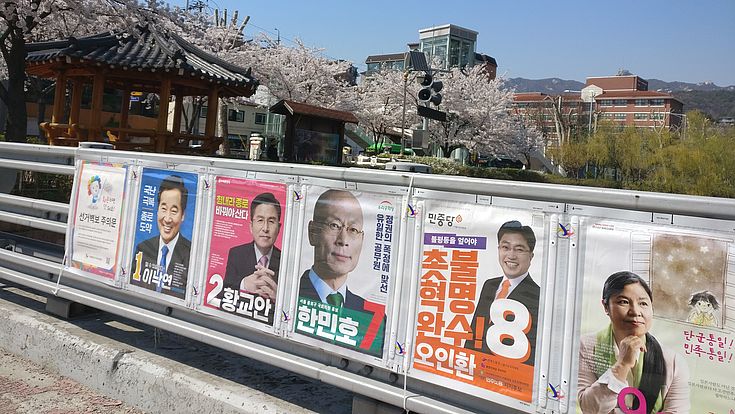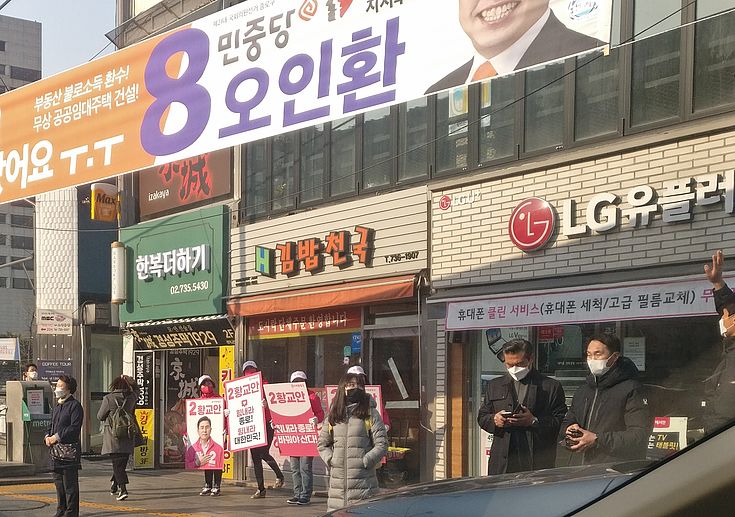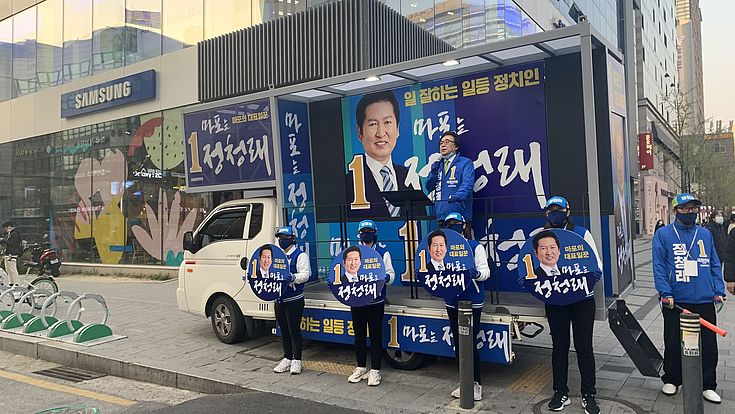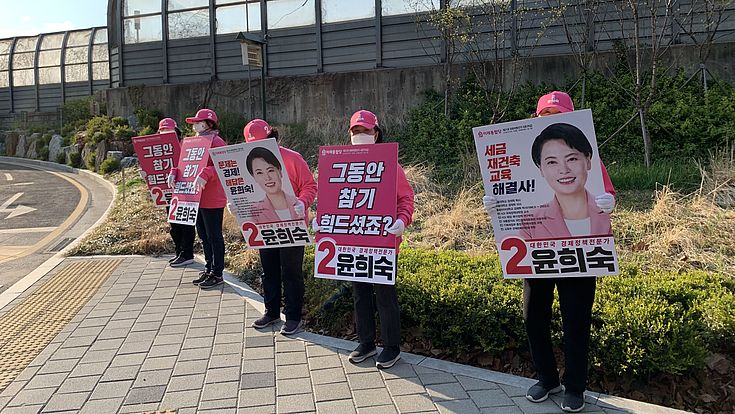Article
Election Victory for the Ruling Party
Overview
In the elections for the 21st National Assembly, the parliament of South Korea, the ruling party, which is the left-wing Democratic Party of President Moon Jae-In, achieved a clear election victory. After Moon himself came into office in 2017 in a by-election due to the impeachment of his predecessor Park Geun-Hye from office, he initially had to govern without a clear parliamentary majority of his own, which now under the given circumstances changed for the rest of his term of office. In addition to the traditional stronghold of the Democratic Party in the southwest of the country, the party succeeded in winning significantly in Seoul (41 seats compared to 8 for the conservative opposition party, the United Future Party ), Gyeonggi Province (51 to 7) and Incheon (11 to 1). Together they form the greater area Seoul, which is home to about half of South Korean citizens.
In contrast, the oppositional United Future Party was able to score points in its strongholds, which are located in the east of the country. A total of 300 seats are allocated in parliament, 257 of which are assigned according to the majority voting system in constituencies. In this process the Democratic Party won significantly with 62 percent of the seats (163) compared to 35 percent (84 seats) for the oppositional United Future Party, five for independent candidates and one for a smaller left-wing party. Together with the seats allocated via list positions, the Democratic Party together with a smaller satellite party, the "Together Citizens´" Party, achieved a total of 179 seats, while the conservative United Future Party with the satellite party Future Korea reached 101 seats. The other seats go to two smaller left-wing parties, Justice Party (5 seats) and the Democratic Party of Korea (1 seat) as well as the centrist "People's Party" (3 seats) and five independent candidates.

Electoral systems and party systems
Korea has a presidential system with a strong, directly elected president who can only run for office once over a period of four years. The National Assembly, which gets also elected for four years, consists of 300 members, of whom 257 are directly elected in a one-man constituency. This results in a traditional two-party system with a large left-wing party (currently the ruling Democratic Party) and right-wing party (currently the oppositional United Future Party).
However, the party system has become more fragmented in recent years. On the left side there have been repeated attempts to found more radical left-wing parties, the most successful party in this respect has been the Justice Party. The even more left-wing United Progressive Party was banned by the Supreme Court in 2015 for violation of the rigid National Security Law, which above all punishes contacts with North Korea and the dissemination of North Korean ideology. On the right side of the party spectrum, the situation was relatively stable for a long time, until the removal of Park Geun-Hye from office led to a split of moderate conservative forces, and at the same time Park Geun-Hye's expulsion from the conservative (now oppositional) party resulted in the formation of two small loyalist parties (Our Republican Party and New Pro-Park Party). Additionally there was a centrist force under the former entrepreneur Ahn Cheol-Soo, which tried in vain to establish itself in the middle of the political spectrum.
Since President Moon Jae-In first had to govern with a parliament without a majority of his own, he was dependent on the votes of the small left-wing and centrist parties. He therefore tried to change the voting system for the representative seats (43 out of 300) so that they would be better represented in the 21st National Assembly. However, as a result, first the conservative United Future Party and then the left-wing Democratic Party founded "satellite parties", which only competed for the representative seats and were therefore successful. The goal of a larger party spectrum was thus counteracted. Ultimately, even during the re-integration of most moderate conservatives into the United Future Party, it became clear that a majority voting system like in Korea always favours the formation of two large parties

Election campaign topics and COVID-19
The pre-election campaign had not necessarily got off to a good start for President Moon. The two most important political issues on his agenda were the fight against unemployment, especially youth unemployment, and the policy of détente on North Korea. By radically increasing minimum wages, however, he achieved the exact opposite, namely significantly higher unemployment figures. The policy of consumption-based recovery through higher wages, of which all economists had unanimously warned, failed. President Moon's second prestige project, the policy of détente on North Korea, was also a flop. After the initial jubilation over North Korea's appearance at the Winter Olympics and the summitry from 2018 to early 2019, North Korea's behaviour changed to an increasingly clear hostility, coupled with condescension towards the lackey state of South Korea. There were also massive problems on the domestic front, after Justice Minister Cho Guk, who had been hailed as a liberal reformer, was forced to resign his office only a few days later due to massive corruption allegations.
Soon, the Corona pandemic overshadowed all other election campaign issues. There too, President Moon and the Democratic Party initially had to contend with headwinds. After the outbreak of the Corona pandemic in and around Daegu, caused mainly by members of a Protestant sect who had been missionizing in Wuhan, many South Koreans demanded a more radical policy towards China. More than a million Koreans signed a petition for the president's resignation and his approval ratings sank even lower.
But then things changed. The South Korean authorities were able to stop the spread of the virus with the help of various measures, summarised as "testing and tracking". More than 400,000 Covid-19 tests were carried out and patients are informed of the results by text message. Daily text messages from the government inform citizens about new cases of infection and their whereabouts to prevent further infections. Internationally, South Korea is now considered a role model in Covid-19 crisis management and is receiving worldwide recognition for its newly recorded successes in the fight against the virus. Especially in the last two weeks, President Moon has enjoyed international attention. Every day the media reported on how much the South Korean strategy is admired and copied by other countries. Opinion makers like the rock star Bono Moon personally admire how South Korea can already help other countries in the crisis. The opposition had nothing to oppose this and in time for the election the approval ratings for President Moon were higher than in the last two years ever - which then led to the current election victory.

Political effects
In the next two years President Moon will have a parliamentary majority, which will simplify his government work. With the help of the parliament he will now be able to implement projects more easily. He avoids the fate of becoming a "lame duck" which has threatened every president, regardless of the parliamentary majority, in the end. Policies that so far only have been validated by ordinances, like the Panmunjeom declaration with North Korea, which has never reached the parliament, might now gather more political attention and validation. In addition, the Democratic Party, together with the smaller left-wing parties, has a 3/5 majority, with which laws can be passed more quickly. In the past, there have been repeated delays of months and sometimes years in legislative projects due to blocking minorities. However, this majority cannot pass amendments to the constitution anymore.
For the next presidential election, the parliamentary elections naturally also have important signal functions. Lee Nak-Yeon, the former prime minister who, in the country's most important constituency, Chongno in Seoul, clearly defeated Hwang Kyo-Ahn, the leader of the opposition, conservative United Future Party, is now the first candidate from the left wing for the presidential election in two years. Hwang, on the other hand, the loser, has clearly shown that as a former close associate of Park Geun-Hye (he was Minister of Justice and then Prime Minister under Park) he has not managed to swim free and credibly renew the conservative party. Even the last-minute appointment of 87-year-old Kim Chung-In as election campaign manager, who studied in Germany and has already successfully advised both right-wing and left-wing parties, had no chance of success. However, one must not forget that now the majority voting system alone, which now ensures a comfortable majority for the Democratic Party, is the only way to achieve this. The left and right wings are relatively evenly matched and even small fluctuations can lead to major shifts in majority.
The Democratic Party has not been able to achieve a real landslide victory, even though this has often been commented on in South Korea because of the clear majority, which is the first left-wing parliamentary majority in sixteen years. This is mainly due to the majority voting system. The centres of power (in the southwest for the Democratic Party and in the east for the United Future Party) continue to exist and even in and around Seoul both wings are not that far apart from each other.
One should be careful of drawing too far-reaching conclusions from the election for future elections or the party system, which is extremely volatile here anyway. In particular, we should not forget the influence of the economic situation on future elections. At this time of crisis, the government has so far avoided a more severe dissension by adopting a policy of extremely easy money. However, the industry's strong dependence on exports is already leading to predictions of a contraction in South Korea's economic output. Given the low return on sales of many companies that are dependent on growth, this could lead to a more difficult situation on the labour market and corresponding dissatisfaction. This is one of the reasons why President Moon's most left-wing supporters, such as the governor of Gyeonggi Province, are now discussing the unconditional basic income. The economic problems cannot be solved in this way, but politically this populism is currently being well received.

Elections in times of pandemic
The election campaign was, due to the ban on larger assemblies, different from previous ones. The mobilisation of voters through direct contact at major events had been particularly important for conservative older voters. The ruling party knew how to use social media effectively. Furthermore, the crisis has given the executive special attention in recent months.
On April 15, 2020, almost 44 million voters were called to vote in one of 14,300 polling stations. The government was preparing for the elections subject to protective measures. Disinfectants and protective gloves were provided. All voters were asked to wear breathing masks and had their body temperature measured on site. Those who had high temperatures or appeared without a mask had to vote in a special voting booth outside the polling station. 50,000 people under home quarantine were not allowed to vote until after 5.20 p.m., when polling stations were already closed to other voters. In addition, more than a quarter of those entitled to vote, 11,7 million people, used postal voting, almost twice as many as in the previous election. However, more than 179,000 Koreans living abroad were unable to cast their votes because polling stations in 40 countries around the world were closed due to the pandemic Overall, the election was calm and without incident.
